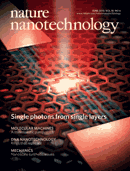 Following “significant concerns” raised by outside researchers and a formal university investigation, a group of authors in Taiwan has retracted a Nature Nanotechnology paper on DNA sequencing after they “could not reproduce the results of the work,” or even provide “a complete set of raw data for the original experiments.”
Following “significant concerns” raised by outside researchers and a formal university investigation, a group of authors in Taiwan has retracted a Nature Nanotechnology paper on DNA sequencing after they “could not reproduce the results of the work,” or even provide “a complete set of raw data for the original experiments.”
The paper, “DNA sequencing using electrical conductance measurements of a DNA polymerase,” describes a technology to sequence single DNA molecules — a technique that the authors, all based at National Chiao Tung University in Taiwan, suggest could be used to “cheaply and quickly” sequence DNA.
Concerns about the paper’s data were first raised in May 2013 by the community, according to an editorial from the journal. Then, the journal asked the university to investigate, says “Notes on a retraction”:
After evaluating the concerns carefully, we contacted the authors’ institution, the National Chiao Tung University, and asked them to launch a formal investigation into the case… The university focused their investigation on the reproducibility of the data. The authors could not reproduce the results of the work within the timeframe set by the investigating committee, and could not provide the committee with a complete set of raw data for the original experiments. In light of this, the authors agreed to retract the paper.
Back in October 2013, the journal published an editorial note mentioning the concerns, but the paper wasn’t retracted until June 2015. It has been cited by 13 other papers, according to Thomson Scientific’s Web of Knowledge.
The editorial lists 10 researchers who “voiced their scientific concerns” about the paper. Yet, nowhere—not in the retraction notice nor in the editorial—does the journal actually describe what those scientific concerns were. We reached out to a few of the researchers listed and will update if they share their concerns with us. The journal declined to do so. A spokesperson from Nature Nanotechnology wrote us:
We have no further comment to make beyond the editorial.
In the end, only three of the six authors agreed to retract the paper, according to the retraction notice:
Significant concerns were raised about the validity of the data reported in this work shortly after publication. After an internal inquiry, a formal investigation was launched at the National Chiao Tung University, which focused on the reproducibility of the data. The results of the work could not be reproduced in a reasonable timeframe, and the authors could not provide the investigating committee with a complete set of raw data for the original experiments. The authors Y.-S. C., J.-C. C. and G. S. H. have therefore agreed to retract the manuscript; C.-H. L., M.-Y. H. and H.-A. P. did not respond to the journal’s attempts to contact them about this retraction.
On PubPeer, commentors have raised questions about the logistics of the experiment and missing details about the methodology. One commenter posted a link to a Taiwan local news article about the investigation.
Along with the scientists who raised concerns about the work, we’ve reached out to corresponding author G. Steven Huang. We will be sure to update if we hear back.
Hat tip: Torbjörn Björkman
Like Retraction Watch? Consider supporting our growth. You can also follow us on Twitter, like us on Facebook, add us to your RSS reader, and sign up on our homepage for an email every time there’s a new post.
Here is the link for a GenomeWeb summary of the issues from back in 2013.
https://www.genomeweb.com/sequencing/industry-experts-question-claims-sequencing-study-published-nature-nanotechnolog
So, they couldn’t find a ” complete set of raw data for the original experiments” for a paper submitted in 2012… I have checking account statements from 1981 in a file box in my garage… barring a fire or a tsunami, how can you lose your raw data in three years? Tsk, tsk.
there are two things, a genuine absence of raw data, and second, agreeing for retraction just because there is no raw data. if i were the authors and i was convinced that there was nothing wrong in the data collection, analysis and interpretation at the time the paper was published, even if i can’t produce the raw data (which is v v strange as no one deletes the raw data at least for many years), i shall stand by my decision and the conclusions of the paper. in this particular case, although i can’t comment on the science of measuring the conductance of the enzyme attached to a transistor, the authors’ agreeing the retract because there is no raw data speaks volume. binay